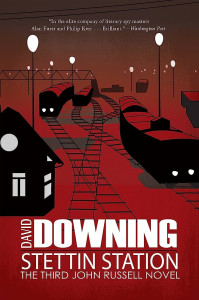 The advance readers’ copies of both of these novels arrived in the Green Man mailroom at about the same time. I have read and reviewed earlier installments in both series. Both are suspenseful tales of the lives of journalists living in Germany during the years the National Socialist Party was in power. So it made sense to review them together.
The advance readers’ copies of both of these novels arrived in the Green Man mailroom at about the same time. I have read and reviewed earlier installments in both series. Both are suspenseful tales of the lives of journalists living in Germany during the years the National Socialist Party was in power. So it made sense to review them together.
A Night of Long Knives is the second novel in Rebecca Cantrell’s series featuring investigative journalist Hannah Vogel. In A Trace of Smoke Hannah emerged as a woman of singular courage and compassion, willing to risk her career and even her life to uncover the truth about the death of her younger brother Ernst and later to guard the safety of the child Anton, whom she comes to love as if he were her own.
A Night of Long Knives opens in early July 1934, three years after the dramatic climax of A Trace of Smoke. Hannah and Anton are just returning to Europe from their relatively safe hiding place in Rio de Janeiro. Hannah has been living and working under a Swiss alias for a Swiss magazine. Longing to see Europe again, she accepts an assignment to cover the flight of a zeppelin from Rio to Zurich. In the first pages of the novel, the zeppelin lands on the north side of Lake Constance, in Germany. Hannah and the boy are immediately abducted by men in the employ of Anton’s biological father, Ernst Röhm, Chief of Staff for the SA, one of several military groups responsible for enforcing the many cruel policies of the Nazi regime.
A trip to Wikipedia will readily confirm that Röhm was a real historical character. As it happens, he was captured, imprisoned, and summarily executed on charges of treason the day after he abducted the fictitious Hannah and Anton. Of course the two are separated, and much of the action of this novel revolves around Hannah’s desperate efforts to determine Anton’s whereabouts and to rescue him from captors who are likely to kill him when they discover his relationship to Röhm.
Like A Trace of Smoke, A Night of Long Knives is written in the first person, entirely from Hannah’s point of view. With brevity and elegance, Rebecca Cantrell provides enough narrative to enable a reader who missed the first novel or who has forgotten key details to make sense of Hannah’s history and to recall the numerous characters from the first novel who make return appearances in this one.
 Stettin Station is the third book in David Downing’s marvelous series about Anglo-American correspondent John Russell, who lived and worked in Berlin from the end of World War I until the United States entered the Second World War in December 1941. In the earlier novels, Zoo Station and Silesian Station, Downing establishes that John has a teenaged son, Paul, who lives with John’s German ex-wife Ilse and his stepfather. John also loves and lives with a film actress named Effi Koenen. A former communist and still active sympathizer, John does occasional courier and other intelligence work for both the Americans and the Gestapo, making him rather hopelessly compromised.
Stettin Station is the third book in David Downing’s marvelous series about Anglo-American correspondent John Russell, who lived and worked in Berlin from the end of World War I until the United States entered the Second World War in December 1941. In the earlier novels, Zoo Station and Silesian Station, Downing establishes that John has a teenaged son, Paul, who lives with John’s German ex-wife Ilse and his stepfather. John also loves and lives with a film actress named Effi Koenen. A former communist and still active sympathizer, John does occasional courier and other intelligence work for both the Americans and the Gestapo, making him rather hopelessly compromised.
Stettin Station opens in November 1941, a very short time before the Japanese bomb the American fleet anchored in Pearl Harbor. Like most people in the know, John suspects that America will enter the war soon and that his time in Germany is thus about to come to an abrupt end. He is trying to figure out a way to get himself and Effi out of the country and how to explain the situation to his son, an active member of the Hitlerjugend (a Nazi youth group).
Unlike the earlier books in this series, which retained Russell’s viewpoint throughout the narrative, this one moves the reader’s attention back and forth between John and Effi (always in third person, by the way). Thus we have an opportunity to witness first-hand Effi’s increasing discomfort with the themes of the films she is expected to perform in. They are often rabidly anti-Semitic.
In fact, the issue of anti-Semitism becomes a predominant theme in Stettin Station, as John spends time with an informer who takes him to observe trainloads of Jews being shipped off to destinations that soon become apparent — either concentration camps or firing squads. In addition, John’s former brother-in-law Thomas continues to employ Jewish workers in his factory, despite of increasing pressure from the authorities to let them go. And Ali Blumenthal, daughter of a Jewish couple who are old friends of John and Effi’s, decides to assume a Christian identity in order to remain in Berlin when other members of her family are carted away.
It’s been a while since I read the first two novels in this series, and there were times when I thought that I needed a refresher in order to remember some of the rather complex plot threads and secondary characters that Downing carried over from Zoo Station and Silesian Station. I imagine this would be even more of an issue for any reader attempting to start the series with Stettin Station. Nonetheless, I was glad to become reacquainted with John and Effi, two of my favorite fictional characters.
There is nothing light or amusing in either of these novels. I would characterize them instead as harrowing page-turners. They also both share common themes regarding the heroism displayed by ordinary people when they find themselves challenged by events around them. If you share my interest in this difficult period in history, I certainly encourage you to check them out!
(Forge, 2010)
(Soho Press, 2010)
